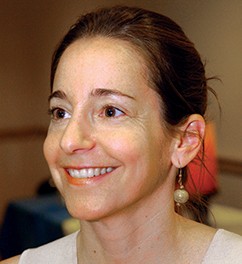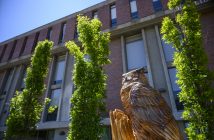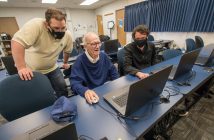Dr. Robert A. Hayes knows full well how service learning can change your life.
In 1985, the University psychology professor was 23 years old, working as a youth minister, leading his first service learning trip to an orphanage in a desert north of Port au Prince, Haiti.
He and a group of 20 students were there to assist with building an educational facility, and as they arrived, children flocked to their van.
“Two things struck me intensely,” Dr. Hayes says. “One, there were no adults. The older children were taking leadership roles in caring for those who were younger. Second, the sheer joy, more like jubilation, that absolutely exploded among the children when we produced a single soccer ball.
“I will be eternally grateful to that community of orphans every single day of my life,” he says.
Dr. Hayes is one of many faculty members and administrators on the Westfield State campus who understands the importance of service learning and who is working to develop it as a key component in the lives of each University student.
Westfield State has long held a focus and importance on learning by giving back to the community through volunteer projects and work. Students, faculty, staff and alumni have always given to their regional and global community in countless ways, through countless efforts.
But the terms used to describe service learning, and the definition of the work, has evolved over the years. When we speak of such learning opportunities now, we speak of “civic engagement.”
“The University understands that civic engagement is not just an added benefit to a students’ program of study, but a necessary piece of the learning experience for students,” Dr. Hayes says. “It provides the opportunity for transformation in how a student views his or her role in their community, in their country and on the globe.”
Under the guidance and direction of Dr. Marsha Marotta, dean of Undergraduate Studies, and thanks to a $148,000 state grant she was instrumental in securing for the University last fall, civic engagement is being developed and strengthened on the campus.
Read about these important advances and the benefits for the Westfield State community in the package of stories on Pages 8 and 9, and you will be inspired and excited.
In its essence, civic engagement allows crucial learning experiences for students. It offers them the opportunity to be instruments of change and transformation in their communities. It gives them the chance to make a difference.
Now, instead of simply filling a temporary need, students will have the chance to make a targeted, focused difference.
Dr. Hayes tells this story to illustrate the benefits of civic engagement for students:
“A group of students was recently working in a meals program in an impoverished area of one of our major cities. On the first day, students were somewhat apprehensive as they passed the long lines of individuals and families who were waiting for entrance to the meal site,” he says. “Serving as volunteers in the community, students provided trays of food, water, a smile, eye contact and often conversation. By the end of that first day, they were overwhelmed with the understanding that if we take away economic differences that contribute to very different life circumstances, we are the same, we are all one.
“Students learned that solutions for a community are often complex, requiring larger public awareness, programs of support and opportunity to those in need,” Dr. Hayes adds. “But they also learned that part of the solution is to break down the barriers that keep us separate from each other. They understand what privilege is, and understand they have the choice to be connected or not with humanity in a fuller sense of the word community.”




